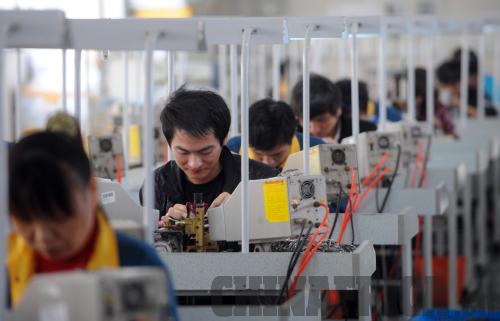|
 |
|
RIPPLE EFFECT: China's exports may nose-dive in 2012, affecting manufacturing production (WANG DINGCHANG) |
Economic uncertainties and expectations of flagging export growth are big concerns for China in 2012. At home, much has been said about over enthusiastic monetary tightening, which may in turn harm the country's growth momentum. This gloomy outlook has placed an onus on policymakers to fine-tune their macroeconomic policies and keep a steady hand on the tiller in steering the economy forword.
For 2012, China will adhere to stable and consistent policies and retain its prudent monetary policy and proactive fiscal policy - the macroeconomic outline was mapped out at the annual Central Economic Work Conference (CEWC), China's top-level economic meeting, held on December 12-14 in Beijing.
At last year's CEWC, China pledged to take a prudent monetary stance for 2011, marking a switch from the moderately loose policy adopted to counter the 2008 financial crisis.
Growth anguish
The Chinese economy is feeling the chill of lackluster exports since the global economy remains on a slippery slope in large part due to the two-year sovereign debt crisis. The credit rating agency Standard & Poor's has recently put 15 eurozone nations on a "credit watch" due to deepening economic and political turmoil in the region.
"If the global recession returns, China's exports may nose-dive 10-12 percent in 2012, taking around 2.25 percentage points off GDP growth, " said the Swiss investment bank UBS in a recent report. "In addition, the ripple effect will also filter through investments and consumptions."
UBS trimmed its forecast for China's economic growth in 2011 to 9 percent from a previous 9.3 percent to reflect weaker prospects in Western economies.
Domestically, signs are emerging that the once-robust growth engine is stalling as policymakers twisted hard on credit screws to quell inflation. Bearing the brunt of the heavy blow were smaller private firms that have found it harder to secure bank loans than state-owned enterprises. Reports have been flooding media outlets that east China's Zhejiang Province, a cradle of private economy, is experiencing massive factory closures and bankrupt entrepreneurs disappearing to avoid huge debts.
The purchasing managers index (PMI), a barometer of manufacturing activities, slumped to 49 percent in November. This was the first time that the index has dropped below the boom-bust line of 50 percent in 33 months.
"Judging from the PMI figures, China is experiencing the most difficult time since the global financial crisis in 2008 and the situation demands the Chinese Government loosens its monetary policies," said Liu Ligang, a researcher from ANZ Greater China.
The quickly cooling real estate market also became a significant drag on growth. Home buyers have stayed on the sidelines, draining life out of the once-exuberant market and dealing a blow to a series of relevant sectors like furniture and appliances.
Zheng Xinli, Vice Chairman of the China Center for International Economic Exchanges, said the CEWC has sent out a message that the country will prioritize ensuring stable growth in 2012.
"The policymakers should coordinate monetary and fiscal policies to benefit economic rebalancing, and lay a solid groundwork for steady growth in the future," he added.
|